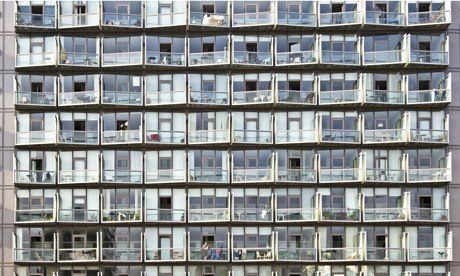Average UK house price rose 8.4% in 2013 after December surge
01-04-2014

Manchester registers fastest increase in Britain, with prices up by an average 21%, but rate of growth lags in Scotland
Rupert Jones theguardian.com
Apartment block, Manchester city centre
Flats near Manchester city centre, the UK housing hotspot of 2013. Photograph: Ian Canham/Alamy
The average price of a British home increased by 8.4% in 2013 after an end-of-year surge which saw £40 a day added to the typical value, according to Nationwide building society.
A typical home ended the year worth £175,826 after increasing in value by 1.4% in December – the largest monthly rise since August 2009, said the society. The figures prompted fresh warnings from some quarters that a new housing bubble could develop.
Nationwide also issued regional data showing that Manchester, and not London, was the city that experienced the strongest house price growth in 2013, with a rise of 21%.
Robert Gardner, Nationwide's chief economist, said: "The UK housing market followed the trajectory of the wider economy through 2013, gaining momentum as the year progressed."
All 13 British regions saw house prices rise during the final three months of 2013, though London and the south-east continued to record the fastest rate, he added.
However, while much of the coverage in 2013 focused on London, Nationwide says Manchester – and specifically the area covered by the city council – was the star performer last year, with London in second place and Brighton in third. According to the society, prices in the capital ended the year up by either 14.9% or 13%, depending on which measure is used, while Brighton saw growth of 12%.
The strong performance in December contrasts sharply with that of 12 months earlier; the average price fell 0.3% in December 2012 to end that year at £162,262, said Nationwide.
Gardner said improvements in the labour market and the brighter economic outlook helped to boost potential buyers' confidence during 2013. "Policy measures also played an important supporting role by helping to keep mortgage rates close to all-time lows and improving the availability of credit, especially for those with smaller deposits," he added. Affordability was also being helped by "ultra-low" interest rates.
The detailed Nationwide data showed there were wide variations by region, with the north of England and Scotland only managing a 1.9% and 3.7% annual increase respectively, Nationwide said. Edinburgh and Glasgow were named two of the "worst-performing" cities in 2013, with annual increases of just 1% and 2% respectively.
However, it was Nationwide's report of Manchester's performance that proved the most eyecatching. It said average prices in the city of Manchester jumped 21% in 2013 to an average of £209,627. That rate of increase far exceeded the annual rise experienced by the wider Greater Manchester area, which was put at 5%, lifting the average price there to £165,897.
Other cities that saw strong price growth last year, according to Nationwide, were Leicester (up 11%) and Birmingham (up 9%-10%).
Howard Archer, chief UK and European economist at IHS Global Insight, said the society's data "can only fuel concern that a new housing bubble could really develop in 2014, especially as the strength in house prices is becoming widespread".
He added: "We expect house prices to increase by around 8% in 2014, with gains across the country. Furthermore, there is a very real possibility that this could prove to be a conservative forecast. Consequently, the decision of the Bank of England and the Treasury to end Funding for Lending support for lending to households from January looks a highly sensible decision, although in itself it is unlikely to act as a major brake on housing market activity."

